-
 Bitcoin
Bitcoin $104,093.1199
0.77% -
 Ethereum
Ethereum $2,508.1404
-0.13% -
 Tether USDt
Tether USDt $1.0000
0.00% -
 XRP
XRP $2.3627
-2.50% -
 BNB
BNB $650.6914
-0.72% -
 Solana
Solana $172.3789
-0.62% -
 USDC
USDC $0.9998
-0.01% -
 Dogecoin
Dogecoin $0.2312
-3.01% -
 Cardano
Cardano $0.8091
-1.58% -
 TRON
TRON $0.2647
1.37% -
 Sui
Sui $4.0149
-0.58% -
 Chainlink
Chainlink $16.9853
-0.04% -
 Avalanche
Avalanche $24.6408
-3.09% -
 Stellar
Stellar $0.3074
-0.88% -
 Shiba Inu
Shiba Inu $0.0...01585
-1.53% -
 Hedera
Hedera $0.2059
-3.84% -
 Toncoin
Toncoin $3.3636
-1.19% -
 Hyperliquid
Hyperliquid $24.9497
-1.85% -
 Bitcoin Cash
Bitcoin Cash $409.0966
-3.20% -
 Polkadot
Polkadot $5.0928
-0.77% -
 Pi
Pi $1.1100
50.04% -
 UNUS SED LEO
UNUS SED LEO $8.3637
-2.10% -
 Litecoin
Litecoin $99.9699
-3.90% -
 Monero
Monero $334.1963
3.85% -
 Pepe
Pepe $0.0...01356
2.26% -
 Bitget Token
Bitget Token $4.8622
0.08% -
 Dai
Dai $0.9999
-0.01% -
 Ethena USDe
Ethena USDe $1.0002
-0.01% -
 Uniswap
Uniswap $6.9041
-0.32% -
 Bittensor
Bittensor $452.3936
-1.53%
What is the relationship between Bitcoin wallet addresses and hardware wallets?
Hardware wallets securely store Bitcoin private keys, generating and managing wallet addresses displayed on the device for sending and receiving Bitcoin; understanding this relationship is crucial for preventing irreversible fund loss.
Feb 28, 2025 at 03:30 am
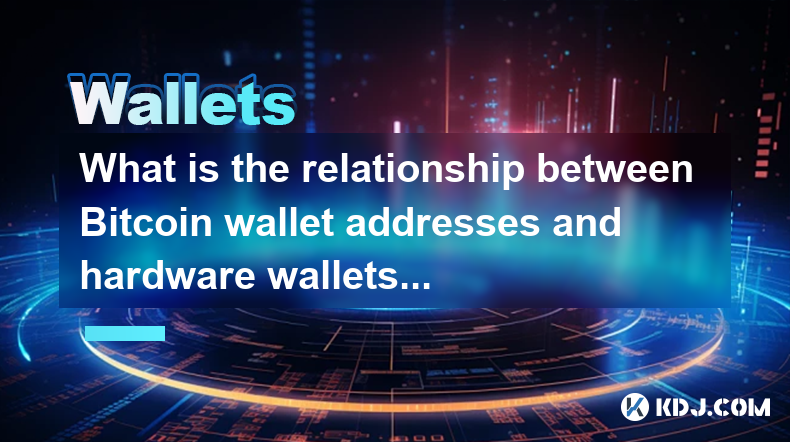
What is the Relationship Between Bitcoin Wallet Addresses and Hardware Wallets?
Key Points:
- Bitcoin wallet addresses are like your bank account number: They are unique identifiers used to receive and send Bitcoin. They don't directly store your Bitcoin, instead they represent a point of access to your funds.
- Hardware wallets are physical devices that securely store your private keys: These private keys are what actually grant you control over your Bitcoin. The hardware wallet protects these keys from theft or compromise.
- The relationship is one of security and access: Your hardware wallet safeguards your private keys, which are then used to generate and manage Bitcoin wallet addresses. The addresses are displayed on the hardware wallet's screen, allowing you to interact with the blockchain.
- Different types of hardware wallets offer varying levels of security and user experience: Choosing the right hardware wallet depends on your technical skills, security needs, and budget.
- Understanding the relationship between addresses and hardware wallets is crucial for secure Bitcoin ownership: Mismanaging either can lead to irreversible loss of funds.
Understanding Bitcoin Wallet Addresses
- A Bitcoin wallet address is a long string of alphanumeric characters (e.g., 1BvBMSEYstWetqTFn5Au4m4GFg7xJaNVN2). It acts as a public identifier, analogous to a bank account number. You share this address with others when receiving Bitcoin. Think of it as the "destination" for your incoming Bitcoin transactions. Multiple addresses can be generated from a single private key, offering enhanced privacy and security. Each transaction uses a unique address to enhance anonymity. Losing access to these addresses doesn't necessarily mean loss of funds if you still retain the private key, but it makes accessing those funds much more difficult. The process of generating these addresses is handled by the wallet software, either on a hardware device or a software application. The addresses are derived from your private keys through cryptographic hashing, a one-way function, meaning it's computationally infeasible to determine the private key from the address alone. This one-way function is the foundation of Bitcoin's security. The address itself doesn't directly contain any Bitcoin; it simply points to the transaction history associated with your private key. Understanding the distinction between the address (public) and the private key (secret) is fundamental to secure Bitcoin management. Your private key is the ultimate authority; without it, you cannot access the Bitcoin associated with the address.
- A single private key can generate many Bitcoin addresses. This is a crucial security feature that allows users to maintain privacy. Each new address generated from the same private key is completely independent and has its own unique transaction history. This means that if you reveal one address, you haven't revealed any information about the other addresses derived from the same key. This approach to address generation is essential for preserving the anonymity and privacy offered by Bitcoin. It also mitigates risks associated with revealing addresses – if one address is compromised, others remain secure. This multi-address functionality is usually integrated directly into the wallet software, making it seamless for the user. The software handles the cryptographic processes behind the scenes, ensuring that new addresses are securely generated and linked to your private key.
- The importance of keeping your Bitcoin addresses private cannot be overstated. Sharing your address with others is generally safe, as it only allows them to send Bitcoin to you. However, you should never share your private key with anyone. Anyone with access to your private key has complete control over your Bitcoin, and there is no recovery mechanism if it's lost or stolen. Therefore, the security of your Bitcoin relies heavily on the security of your private keys. This is where hardware wallets play a crucial role.
Understanding Hardware Wallets and Their Role in Securing Bitcoin
- A hardware wallet is a physical device specifically designed to store your Bitcoin private keys offline. This offline storage is the core of its security. Unlike software wallets, which store keys on your computer or phone, making them vulnerable to malware or hacking, hardware wallets keep your private keys physically separated from the internet and potentially vulnerable devices. They usually have a small screen and buttons for navigation, enabling you to interact with the blockchain and authorize transactions without exposing your private keys to the internet. The security model of a hardware wallet typically involves a secure element, a tamper-resistant chip that protects the private keys from unauthorized access. This chip is designed to withstand physical attacks and prevent software-based compromises. The level of security provided by a hardware wallet varies depending on the manufacturer and the specific model. However, generally, they offer a significantly higher level of security than software wallets.
- The interaction between a hardware wallet and a Bitcoin address is indirect but crucial. The hardware wallet generates and stores the private keys. When you want to send or receive Bitcoin, the hardware wallet displays the relevant Bitcoin address on its screen. You then use the device's buttons to confirm transactions, which involves cryptographic signing of the transaction using your private keys. This process happens entirely on the secure element of the hardware wallet, without exposing your private keys to the external world. This ensures that even if the hardware wallet itself is compromised (e.g., physically stolen), the private keys remain protected, thanks to the secure element's design. The signing process is fundamental to the integrity and security of Bitcoin transactions. Without proper signing using your private keys, the transaction cannot be validated on the Bitcoin blockchain.
- Different hardware wallets employ various security features, such as passphrase protection, PIN codes, and recovery seed phrases. These additional layers of security provide further protection against unauthorized access. The passphrase adds an extra layer of encryption to your private keys, requiring both the device and the passphrase for access. The PIN code prevents unauthorized use of the device. The recovery seed phrase is a backup mechanism that allows you to recover your private keys if your hardware wallet is lost or damaged. However, it is crucial to understand that the security of your recovery seed phrase is as critical as the security of the hardware wallet itself. Properly securing this phrase is paramount to preventing the complete loss of your Bitcoin. The choice of a hardware wallet should depend on individual security needs and technical expertise. Some hardware wallets are more user-friendly than others, while some offer more advanced security features. Researching and comparing different options is essential before making a purchase.
The Importance of Understanding the Interplay
- The relationship between Bitcoin wallet addresses and hardware wallets is essential for secure Bitcoin management. Hardware wallets provide a robust security layer by storing private keys offline, while Bitcoin addresses act as public identifiers for receiving and sending Bitcoin. The secure generation and management of addresses within the hardware wallet is what ensures that your funds remain secure and accessible only to you. A comprehensive understanding of this relationship is crucial for preventing the loss of your Bitcoin. Ignoring this interaction can lead to significant financial losses.
FAQs:
Q: Can I use a hardware wallet without understanding Bitcoin addresses?
A: While many hardware wallets aim for user-friendliness, understanding the concept of Bitcoin addresses is crucial for effective and secure management of your Bitcoin. The hardware wallet simplifies the process, but the underlying mechanisms still rely on addresses for transactions. You'll see your addresses on the screen of the device and need to understand their role in receiving and sending funds.
Q: Can I access my Bitcoin if I lose my hardware wallet but remember my seed phrase?
A: Yes, your seed phrase is a backup for your private keys. If you lose your hardware wallet, you can use your seed phrase to restore your Bitcoin on a new hardware wallet or a software wallet. However, securing your seed phrase is paramount, as its compromise will result in the loss of your Bitcoin.
Q: Are all hardware wallets equally secure?
A: No, hardware wallets vary in their security features, chipsets, and overall design. Some offer more advanced security measures than others. Research and reviews are essential before choosing a hardware wallet.
Q: Can my hardware wallet be hacked?
A: While hardware wallets are significantly more secure than software wallets, they are not entirely immune to hacking. Physical attacks, sophisticated phishing schemes, and supply chain vulnerabilities remain potential risks. Choosing a reputable brand and following best security practices are crucial.
Q: What happens if I lose my private keys?
A: If you lose your private keys, you lose access to your Bitcoin. There is no recovery mechanism for lost private keys. This underscores the critical importance of secure key management and backup strategies.
Disclaimer:info@kdj.com
The information provided is not trading advice. kdj.com does not assume any responsibility for any investments made based on the information provided in this article. Cryptocurrencies are highly volatile and it is highly recommended that you invest with caution after thorough research!
If you believe that the content used on this website infringes your copyright, please contact us immediately (info@kdj.com) and we will delete it promptly.
- Whale Accumulation Fuels Dogecoin Rise
- 2025-05-12 05:10:13
- title: One major crypto exploit is striking the BNB Chain ecosystem
- 2025-05-12 05:10:13
- After an Explosive Breakout That Took Bitcoin Beyond the $100,000 Mark
- 2025-05-12 05:05:13
- As Crypto Markets Rally into Mid-2025, Investors Are Zeroing in on Projects Delivering Real Momentum
- 2025-05-12 05:05:13
- Savvy investors locked in gigantic yields from last year's Dogecoin and Cardano rallies.
- 2025-05-12 05:00:12
- Recent Surge of Cardano (ADA) Activity Among Whale Investors Has Catalyzed the Token's Price Movement
- 2025-05-12 05:00:12
Related knowledge
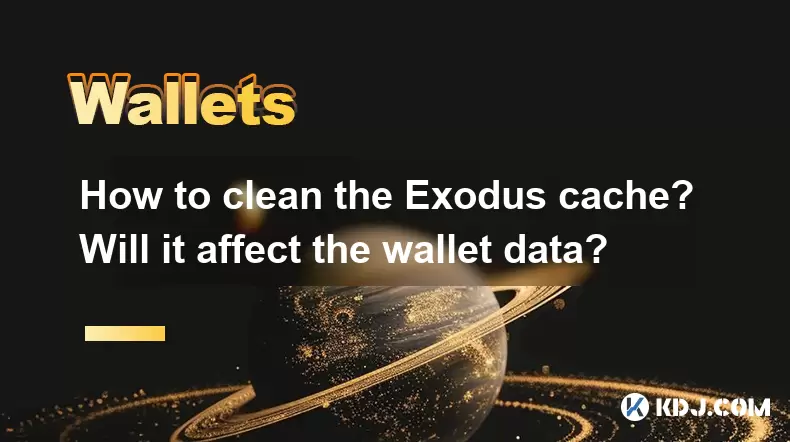
How to clean the Exodus cache? Will it affect the wallet data?
May 11,2025 at 12:49pm
Cleaning the cache in the Exodus wallet is a routine maintenance task that can help improve the performance of the application. However, many users are concerned about whether this action will affect their wallet data. In this article, we will guide you through the process of cleaning the Exodus cache and explain why it does not impact your wallet data....
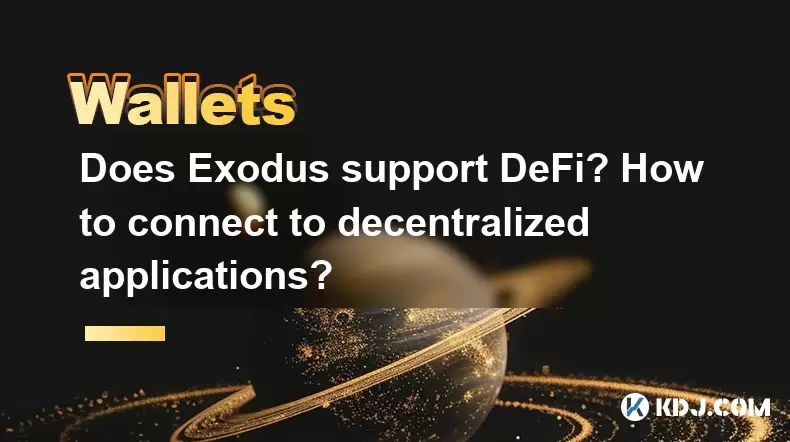
Does Exodus support DeFi? How to connect to decentralized applications?
May 10,2025 at 08:36pm
Does Exodus Support DeFi? How to Connect to Decentralized Applications? Exodus is a popular cryptocurrency wallet known for its user-friendly interface and support for a wide range of cryptocurrencies. However, one of the frequently asked questions among users is whether Exodus supports DeFi (Decentralized Finance) and how to connect to decentralized ap...
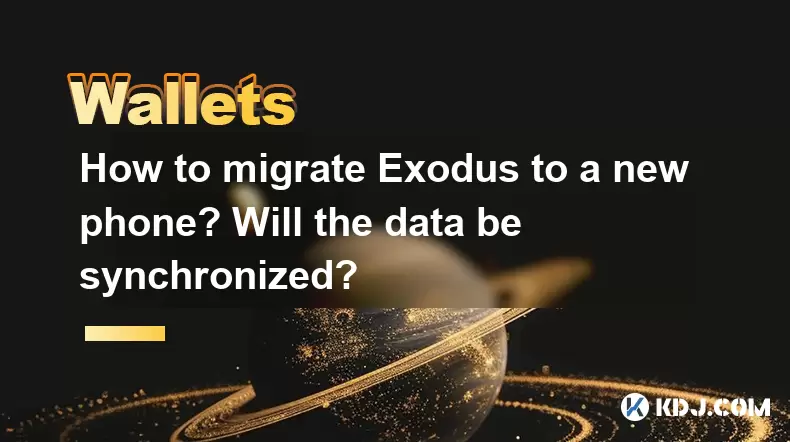
How to migrate Exodus to a new phone? Will the data be synchronized?
May 11,2025 at 03:28pm
Migrating your Exodus wallet to a new phone is a straightforward process that ensures your cryptocurrency data remains secure and accessible. This guide will walk you through the steps to successfully transfer your wallet to a new device, and address whether your data will be synchronized during the process. Preparing for the MigrationBefore you begin t...
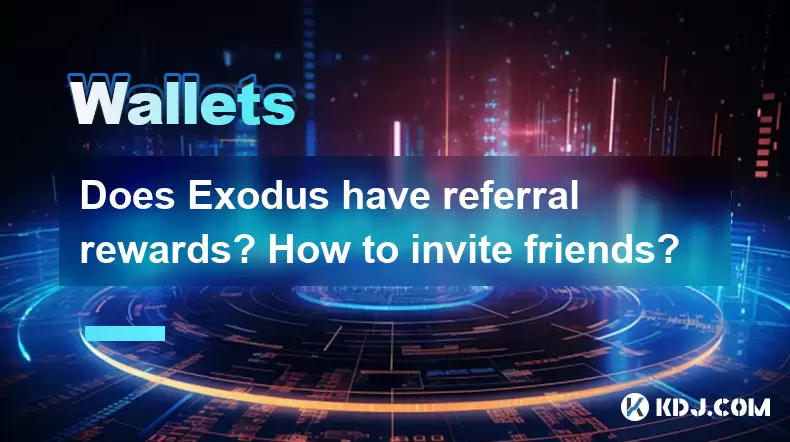
Does Exodus have referral rewards? How to invite friends?
May 09,2025 at 10:01pm
Does Exodus have referral rewards? How to invite friends? Exodus, a popular cryptocurrency wallet, has gained a significant user base due to its user-friendly interface and robust features. One common question among users is whether Exodus offers referral rewards and how to invite friends to join the platform. In this article, we will explore these topi...
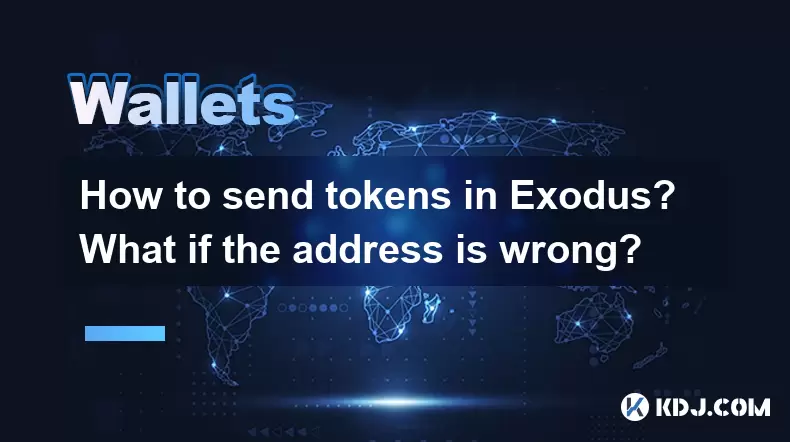
How to send tokens in Exodus? What if the address is wrong?
May 11,2025 at 07:35pm
Sending tokens in Exodus can be a straightforward process if you follow the correct steps. However, it's crucial to be cautious, especially when entering the recipient's address. This guide will walk you through the process of sending tokens in Exodus and what to do if you mistakenly enter the wrong address. Preparing to Send TokensBefore you begin send...
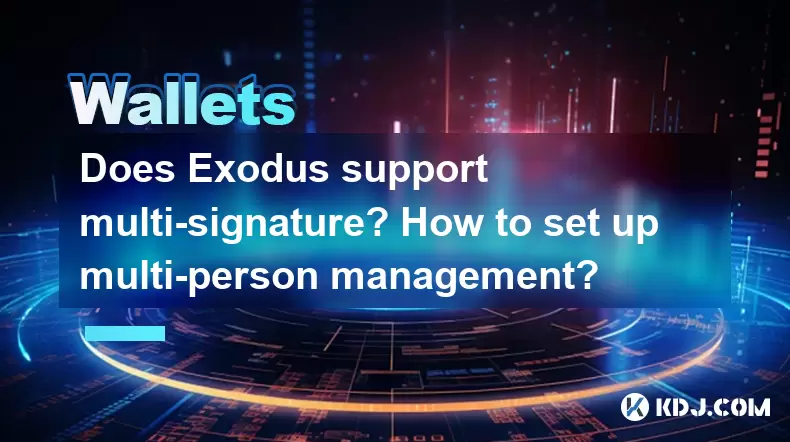
Does Exodus support multi-signature? How to set up multi-person management?
May 11,2025 at 12:01am
Does Exodus Support Multi-Signature Wallets?Exodus, a popular cryptocurrency wallet known for its user-friendly interface, does not currently support multi-signature wallets. Multi-signature (multi-sig) wallets are a type of wallet that requires more than one private key to authorize a transaction, enhancing security by requiring multiple parties to agr...

How to clean the Exodus cache? Will it affect the wallet data?
May 11,2025 at 12:49pm
Cleaning the cache in the Exodus wallet is a routine maintenance task that can help improve the performance of the application. However, many users are concerned about whether this action will affect their wallet data. In this article, we will guide you through the process of cleaning the Exodus cache and explain why it does not impact your wallet data....

Does Exodus support DeFi? How to connect to decentralized applications?
May 10,2025 at 08:36pm
Does Exodus Support DeFi? How to Connect to Decentralized Applications? Exodus is a popular cryptocurrency wallet known for its user-friendly interface and support for a wide range of cryptocurrencies. However, one of the frequently asked questions among users is whether Exodus supports DeFi (Decentralized Finance) and how to connect to decentralized ap...

How to migrate Exodus to a new phone? Will the data be synchronized?
May 11,2025 at 03:28pm
Migrating your Exodus wallet to a new phone is a straightforward process that ensures your cryptocurrency data remains secure and accessible. This guide will walk you through the steps to successfully transfer your wallet to a new device, and address whether your data will be synchronized during the process. Preparing for the MigrationBefore you begin t...

Does Exodus have referral rewards? How to invite friends?
May 09,2025 at 10:01pm
Does Exodus have referral rewards? How to invite friends? Exodus, a popular cryptocurrency wallet, has gained a significant user base due to its user-friendly interface and robust features. One common question among users is whether Exodus offers referral rewards and how to invite friends to join the platform. In this article, we will explore these topi...

How to send tokens in Exodus? What if the address is wrong?
May 11,2025 at 07:35pm
Sending tokens in Exodus can be a straightforward process if you follow the correct steps. However, it's crucial to be cautious, especially when entering the recipient's address. This guide will walk you through the process of sending tokens in Exodus and what to do if you mistakenly enter the wrong address. Preparing to Send TokensBefore you begin send...

Does Exodus support multi-signature? How to set up multi-person management?
May 11,2025 at 12:01am
Does Exodus Support Multi-Signature Wallets?Exodus, a popular cryptocurrency wallet known for its user-friendly interface, does not currently support multi-signature wallets. Multi-signature (multi-sig) wallets are a type of wallet that requires more than one private key to authorize a transaction, enhancing security by requiring multiple parties to agr...
See all articles





















































































